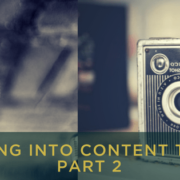Top tips for writing website content
There are very few cases these days where a business doesn’t need a website. Anyone thinking of working with you is going to want to check you out on your website. If you don’t have one, they may ask themselves why and wonder if you’re a legitimate business.
That said, the words you use on your website are at least as important as how well the site functions technically. So, when you come to write your website content, what are our top tips?
Know where your website fits in your business and in the visitor journey
What you include on your website depends very much on why people come to visit it. For a typical business, the website is part of the marketing and sales process, so think about where it fits in the customer journey.
Do prospects find you on Google, for example, so the site is ‘first contact’? Or do they find you elsewhere (referrals, maybe) and this is second step? Or is it even later in the journey – they visit to do due diligence before signing a contract? Or is it where you send customers to place the order once all the sales process is complete?
The content you use will be quite different in each of these cases.
And, if none of these apply, that’s okay. Just be clear on who visitors are and what they’re looking for.
Once you know this, you can tailor your website content to answer the questions in your visitor’s mind.
Don’t wait for ‘complete’
One of the most common conversations we have with people writing their own website is, “I’ve written some of it, but I’ve still got some pages to write.” My advice is always, “Don’t wait to get your website live.” A site with just a home page is going to be more effective than no site at all, so if that’s all you have written so far, publish it. As long as you have a call to action (‘Contact Us’ for example) and the home page touches on the most important things your site visitor wants to know, you can add more pages later.
Talk to your audience – the 3:1 ratio
Take a look at your home page and count up how many times you use “I” or “We.” Now see how often you say “You.” The ratio should be three “You’s” to every “We.”
In other words, talk about your audience and their concerns, not about you and what you do. Frankly, on a home page no one cares about you. They have come to see if you can solve their problem, so answer their question.
To support that, put testimonials high on the home page. Don’t make your visitor hunt to find proof that you’re good at what you do (because, usually, they won’t bother). So many sites have an engaging first section and then go immediately into talking about themselves.
If someone wants to know about you they can look elsewhere.
Take care of your About page
Which leads me to the ‘About’ page.
This is the second most visited page on most websites. That doesn’t mean it’s the second place someone will go but, in most cases, they will keep coming back to it throughout the decision making process. Make sure everything that’s needed is included here, and keep it up to date.
Talk about your company values, who you love to work with and why, the history of the business and your credentials. Tell your visitor all the things they need to know about you and your team to make a confident decision.
Maintain your website content regularly
We’ve all been there. We’ve visited a website which is still telling us about the COVID protocols they have in place: masks, 2 meter distancing and the like. In other words, no one has looked at the website for several years. Or you take a look at the blogs, and they are all dated July 2017.
The message this sends out is either “we’re no longer trading but haven’t cancelled our web hosting,” or “We don’t finish what we start.” In either case, your visitor will quickly go elsewhere.
Don’t fall into this trap. Set aside time every three months or so to give your website a once over. Add anything recent to the history; check the services or products you offer are still current; test the links to be sure they still work.
A quick check every three months makes this an easy and simple task. Leave it too long and you’ll have to rewrite large sections of the site and it becomes harder to do.
Whether you’re setting up your first website or know it’s time to give your existing site a revamp, getting the content right is key. That’s where our new online course, ‘Website Gold’ comes in – click here for all the details.












Leave a Reply
Want to join the discussion?Feel free to contribute!